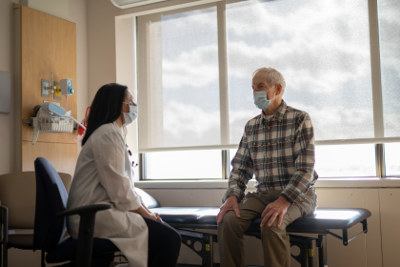By Heather Blumenthal

Mr. Snider was one of the first patients to enrol in the trial. At the time, his lymphoma had returned, for the third time in 10 years. His doctors had given him maybe six months to live. Then he was told about the Canadian-Led Immunotherapies in Cancer (CLIC-01) clinical trial, funded in part by BioCanRx. Today, 18 months later, Mr. Snider remains cancer-free and, as he has said publicly several times, he appreciates each and every day.
Mr. Snider is one of an eventual 60 patients who will participate in the trial, about half of whom have been enrolled so far. And with each patient who receives treatment, lead investigator Dr. Natasha Kekre of The Ottawa Hospital gets a little more excited.
“We are now seeing success, and that’s been huge for us,” she says.
But, she adds, the importance of this trial goes much further. It is the first trial that uses Canadian-made CAR T cells and, if successful, it means that further research innovations will be available to Canadian patients.
CAR T cells, or chimeric antigen receptor modified T cells, are not simple, off-the-shelf products. They are, says Dr. Kekre, much more complex than drugs. They work by enhancing the body’s own immune system to better attack cancer.
The cells are made from patients’ own T cells, a type of immune system cell. The T cells are extracted from their blood, genetically modified in the lab to be more active, and then re-administered to the patients. These “souped-up” immune cells are then better able to attack and kill cancer cells.
CAR T cells have shown tremendous promise in treating cancers that haven’t responded to other treatments. To date, two CAR T cell therapies are on the market, targeting certain types of B-cell lymphoma and acute lymphoblastic leukemia, but this came years after clinical trials were completed elsewhere. Without the ability to manufacture CAR T cells in Canada, patients in Canada would continue to wait for approvals like this, putting them at the end of the line for these therapies.
“We want to build up the research infrastructure,” says Dr. Kekre. “Canadian cancer patients shouldn’t have to wait for the research to be done elsewhere, but be able to participate in innovative clinical trials here at home.”
Support from BioCanRx helped develop that manufacturing capacity here in Canada; the CLIC-01 trial is the first to use these home-grown CAR T cells. But, says Dr. Kekre, it won’t be the last. She is looking forward to a future of “more trials, more cancers, more patients.”
CLIC-01 is critically important for the patients involved. But it is also being watched closely for its impact on future research that will be carried out, here in Canada and for the benefit of Canadian patients. A giant step in cancer treatment, indeed.
Additional funding for this trial was provided by BC Cancer, OICR, The Ottawa Hospital Foundation and the Leukemia & Lymphoma Society of Canada.
Heather Blumenthal has been writing about health and health research for more than 20 years and never loses her fascination with the advances Canadian researchers are making.